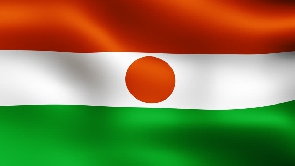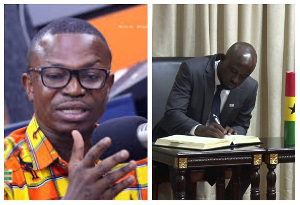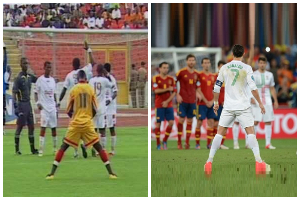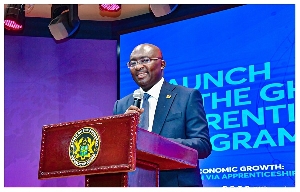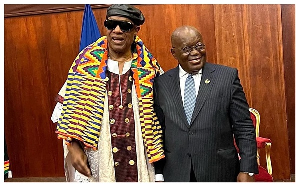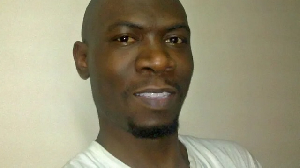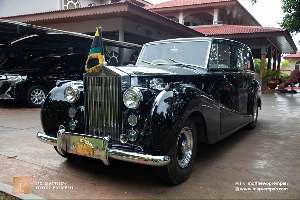Opinions of Saturday, 26 August 2023
Columnist: Kwame Dwomoh-Agyemang
The Nigerien coup, an ECOWAS conundrum?
Niger is a huge landmass spanning over 1,276,000 km, over five times the
size of Ghana. A ‘poor’ country with such a vast landmass. Locals who struggle to earn meet with a sizeable number of them dotted across the West African sub-region. Niger is Africa's most important uranium ore exporter (75% of the country's total exports). One would have thought that earnings from the exploitation of this very important resource and more could do the trick in terms of alleviating the poverty levels of its citizens.
Far from that. Sadly, this is the case of not only Niger but a replica of many
an African country. From the North to the south of the second largest continent on the planet are 54 nations blessed with unmatched resources but as a result of poor leadership, corruption, neo-colonialist tendencies, and greed, the majority of these nations have struggled to fully utilize their resources.
Niger was thrown into the spotlight with a coup on the 26th of July, 2023 when the democratically elected Mohammed Bazoum was ousted by General Abdourahamane Tchiani on the back of what the Military said was to avoid "the gradual and inevitable demise" of the country and accusing him of covering up the country's situation.
You can draw your conclusions on what they, the Military, mean by this but was this inevitable following what transpired in Mali, Guinea, and Burkina Faso?
Neo-colonialism
Majority of the nations in the Sub Region of Ecowas namely Senegal, Burkina Faso, Mali, Niger, Togo, Benin, Guinea-Conakry, and La Cote D’Ivoire were all colonized by the French. That in itself may not be an issue. The challenge though is the stranglehold of these nation-states by France after all these years of attaining independence.
The French found a way to get leaders of these states after attaining independence to virtually sign off their economic space by giving them the first option on their natural resources through the instrumentation of Jacques Foccart.
Foccart was Secretary-General for African and Malagasy Affairs under Presidents Charles de Gaulle and Georges Pompidou between 1960-74.
Foccart was pivotal in maintaining France's sphere of influence in sub-Saharan Africa (or Francafrique) by putting in place a series of cooperation accords with individual African countries and building a dense web of personal networks that underpinned the informal and family-like relationships between French and African leaders. He was the main architect behind several coups in Africa during his time as Minister.
It is also a known fact that when African leaders refused to play ball, they
were toppled in a coup, or assassinated (Thomas Sankara), or the opposition was heavily sponsored in elections through the influence of powerful French Companies.
Those who played ball, i.e. Felix Houphouet-Boigny (Ivory Coast), Abdou Diouf (Senegal), Gnassingbe Eyadema (Togo), General Lansana Conte (Guinea-Conakry) Omar Bongo (Gabon), Dennis Sassou Nguesso (Republic of Congo) were/are perpetually kept in office to do the bidding of France. In return for their longevity in office, their puppets gave them the first option on Mineral Concessions, Timber rights, and oil at the expense of the locals. For how long could this arrangement work?
The 4 coups
A cursory look at all four coups in the sub-region, i.e., Guinea-Conakry, Mali, Burkina, and Niger tells an all too familiar story. All four countries were colonized by France. The French have a huge sway of control in these countries. Their companies control the economic space whilst Paris strongly influences the leadership direction of these countries. There were very high levels of corruption by greedy state officials through kickbacks and awards of contracts and insecurity.
Guinea-Conakry
After serving two terms as President, Alpha Conde changed the constitution through a dubious referendum to allow him to seek a 3rd term. It is fair to say that despite days of street protests which led to the death of hundreds of people, President Conde succeeded in riding the storm until he was overthrown by his protégé Mamadou Doumboya. Doumbaya, Head of the powerful Revolutionary Guard, a Special Forces Unit that protected the President was pretty much aware of the ills of Conde and his French Legion with the support of Lebanese businessmen in looting the state.
Doumboya will claim he staged the coup to stop further looting of state resources. Guinea boasts of one of the largest deposits of bauxite and iron ore. It also has huge deposits of diamonds, among a vast amount of other minerals like gold, salt, cement, and granite. Under Conde, the mining sector flourished. But observers say very little trickled down to the masses, who were constantly faced with a rising cost of living amid deficiency in basic services like power, water, sanitation, and hygiene.
Burkina-Faso
The story of Burkina Faso is no different. It is common knowledge that French President Francois Mitterand and his government were very much behind the assassination of Captain Thomas Sankara who was against their anticolonial actions in depriving the country of its resources. In his place, a stooge, Blaise Campaore, was foisted on the Burkinabe for 27 years before he was chased out to Abidjan a couple of years ago. Subsequent Democratic leaders did not help the cause of the locals leading to the Military Coup last year. The same issues of corruption, mismanagement, and greed popped up.
Mali
The case of Mali is no different either. I spent two years of my childhood
in Bamako and pictures of the city after all these years are encapsulated
in poverty. Very little development can be seen in all the exports of gold,
fertilizers, oil, and iron. Whilst the Political elite and French Companies
plundered the wealth of the country, the majority of the locals live in abject
poverty.
Niger
The story of Niger is pathetic. How does a country with one of the largest
deposits of Uranium on this planet be this poor? As for 2022, according to
Euratom, cited by French Le Monde newspaper (here.), 1,440 tonnes of uranium were imported from Niger by France in 2022 (20.2% of 7,131 tonnes imported that year). Niger is the world's seventh-biggest producer of uranium, according to the World Nuclear Association (WNA) EU nuclear agency Euratom told Reuters that Niger was the second-largest supplier of natural uranium to the European Union in 2022.
Euratom said that in 2022 Niger delivered 2,975 tonnes of elemental uranium (tU), or 25,4% of the EU's supplies. Kazakhstan was the biggest supplier for the bloc, with Canada third.
France derives about 70% of its electricity from nuclear energy and uses some 9,700 tonnes of uranium oxide concentrate (8,200 tonnes of uranium) per year for its electricity generation.
To put this in context, up to 30% of power in France is generated from Uranium in Niger. One would have thought that. To add insult to injury, the Nigerians have long attempted to negotiate the terms of the Uranium deal with French company Orano (formerly Areva) from a paltry 5% to 12% to no avail. Orano is a company owned by the French Government.
It is instructive to note that France’s dominance over its former colonies is so tied up economically to the extent that revenues accruing from its transactions do not find their way into the central banks of its former colonies. It ends up at the Central Bank of France. Now when these countries want to access their funds, they access these same funds as loans. Sounds laughable but that is the reality. Imagine the revenues of Ghana finding their way to the Bank of England and then accessing these same funds as loans. A madman may not make sense of this.
The case of the Democratic Republic of Congo is another sad story of how Colonial forces have long maintained their stranglehold on the continent long after the Independence of these states. The proliferation of resources from Mineral resources since the brutal elimination of Patrice Lumumba by the West and the perpetuation of a brutal dictator like Mobutu Sese Seko over three decades says a lot about how African countries have suffered and continue to suffer under Western dominance despite attempts to chart their paths.
Leadership/democracy
A cursory look at the leadership of the individual states pushing for Military Intervention in Niger says a lot about the sub-region. Coups may not be acceptable to many in these days of “Democracy” but how many of these leaders are in office ‘legitimately’ to offer lectures to Niger?
President Alassane Ouattara is still President of La Cote d’Ivoire after overturning the constitution and eliminating virtually all political opponents. Hundreds of people lost their lives when the locals rebelled against the referendum by Ouattara. To add insult to injury, leaders of as many West African states attended his inauguration for his 3rd term.
It was not any different in Guinea with a frivolous referendum that gave Alpha Conde a 3rd term.
President Macky Sall of Senegal tried desperately to amend the constitution
for a 3rd term but did not have enough support for that to be successful. He has however succeeded in arresting virtually all his political opponents including Ousmane Sonko who strongly opposed that.
Faure Gnassingbe in Togo ascended the Presidential throne following the death of his father in 2005. He has succeeded in changing the constitution to allow him to contest the elections in the last two decades.
We all saw what transpired in Tinubu’s Nigeria. The irregularities were palpable for all to see. These leaders with very questionable democratic credentials are leading the Military Intervention conversation against Niger.
Russian influence
It is instructive to see the level of support for Russia in the midst of all of
these developments. One would wonder what the Russians may be offering to generate this level of support. At the recent Africa-Russia summit, Russian President Vladimir promised to promote a multipolar world order and fight neocolonialism as he offered debt write-offs and grain to woo allies.
As well as dealing with issues concerning illegitimate sanctions and attempts to undermine traditional moral values in addition to assured security (Military Assistance, training, equipment, etc.), fair trade practices, and noninterference in their affairs amongst others.
A lot has been written and said about the influence of the Wagner Group and some atrocities they may have afflicted in the discharge of the duties for which they were hired by governments in the sub-region but have the French and other Western Interests not done worse over the decades?
Economic development
A cursory look at the Per Capita Income of all four countries where the coups have taken place demonstrates the levels of poverty there. The figures as captured by the World Bank in 2022 and the ranking of these countries show the levels of poverty of the locals. Guinea-Conakry ranked 166th with a Per Capita of $2,993, Mali ranked 174th with a PCI of $2,609, Burkina ranked 171st with a PCI of $2,656 with Niger ranked 188th with a PCI of $1,443. What these countries generate and export concerning their stated resources, is sad and wicked.
Successive leaders have connived with various French Companies and others from the West to siphon the resources of those states with very little revenue making its way into the lives of the locals.
In the case of Niger, an Al Jazeera Documentary has revealed the huge health challenges of the locals in areas where Uranium is mined with very little compensation to the locals. Whilst the rate of development of these nations has been slow as the pace of the snail, the impact of their resources(revenue) has contributed greatly to the development of France and more.
To operate the fifty-six nuclear reactors in France's eighteen power plants, operator EDF requires an average of around 8,000 tons of natural uranium every year. Following the cessation of mining on French soil in the early 2000s, France turned to several countries simultaneously for its supplies.
The diversification of suppliers is a source of security for EDF. Over the last ten years, the 88,200 tonnes of natural uranium imported into France came mainly from three countries: Kazakhstan (27%), Niger (20%), and Uzbekistan (19%). Guess this data connects.
Security
Despite the increase in foreign forces, especially from the US and France, and military bases in Niger, the leadership has been unable to stop insurgent attacks. There are several insurgent groups, such as Al-Qaeda and Islamic State affiliates, as well as Boko Haram operating in the country.
These attacks have resulted in thousands of deaths and displacements in the last decade. Hundreds of youths in the capital, Niamey, gathered to celebrate the July coup, waving Russian flags and chanting “Wagner”. This suggests that some people in Niger believe the military, supported by Russia and the private military contractor, Wagner group, would do a better job of fighting insurgents.
Again, the large number of foreign military troops and bases in the country has not been well received by the military. In 2019, the US opened a drone base in Niger despite protests. As I have pointed out before, the drone base could make Niger a target for terrorists and increase instability.
In 2022, France and other European allies withdrew their forces from neighboring Mali. Bazoum was quick to invite them to Niger. The Nigerian military
leadership and some influential individuals in the country denounced the increase in foreign forces.
ECOWAS
ECOWAS through some Heads of State and Defence Chiefs has been drumming up the Interventionist conversation. A few questions naturally arise.
Who pays for it?
Who provides the Military equipment to be used for the intervention?
How many troops would be contributed by the sanctioning states for
the intervention?
Are the various leaders prepared for the backlash with the potential loss of lives of their troops?
With the land size of Niger, there can be the potential for a long drawn-out war. Is ECOWAS ready for potential refugee challenges and its impact on the West African sub-region?
Burkina Faso, Mali, and Guinea are threatening to back the Nigerian Military if there is a Military Intervention.
Let the leaders of the sub-region and the continent be circumspect into opting for a Military solution. Where were these leaders following what transpired in the other three West African states? For the AU who have been quick to suspend Niger, how many of the 54 African countries practice any serious democracy akin to what exists in the West with all the questionable elections we have witnessed all these years?
Coups may not be tolerable or fashionable these days but who started them? There is a litany of examples of Western support for coups all over the continent. The West should spare the continent of its Democratic noises and lectures. It is only the blind who do not notice that they are only here for their interests.

